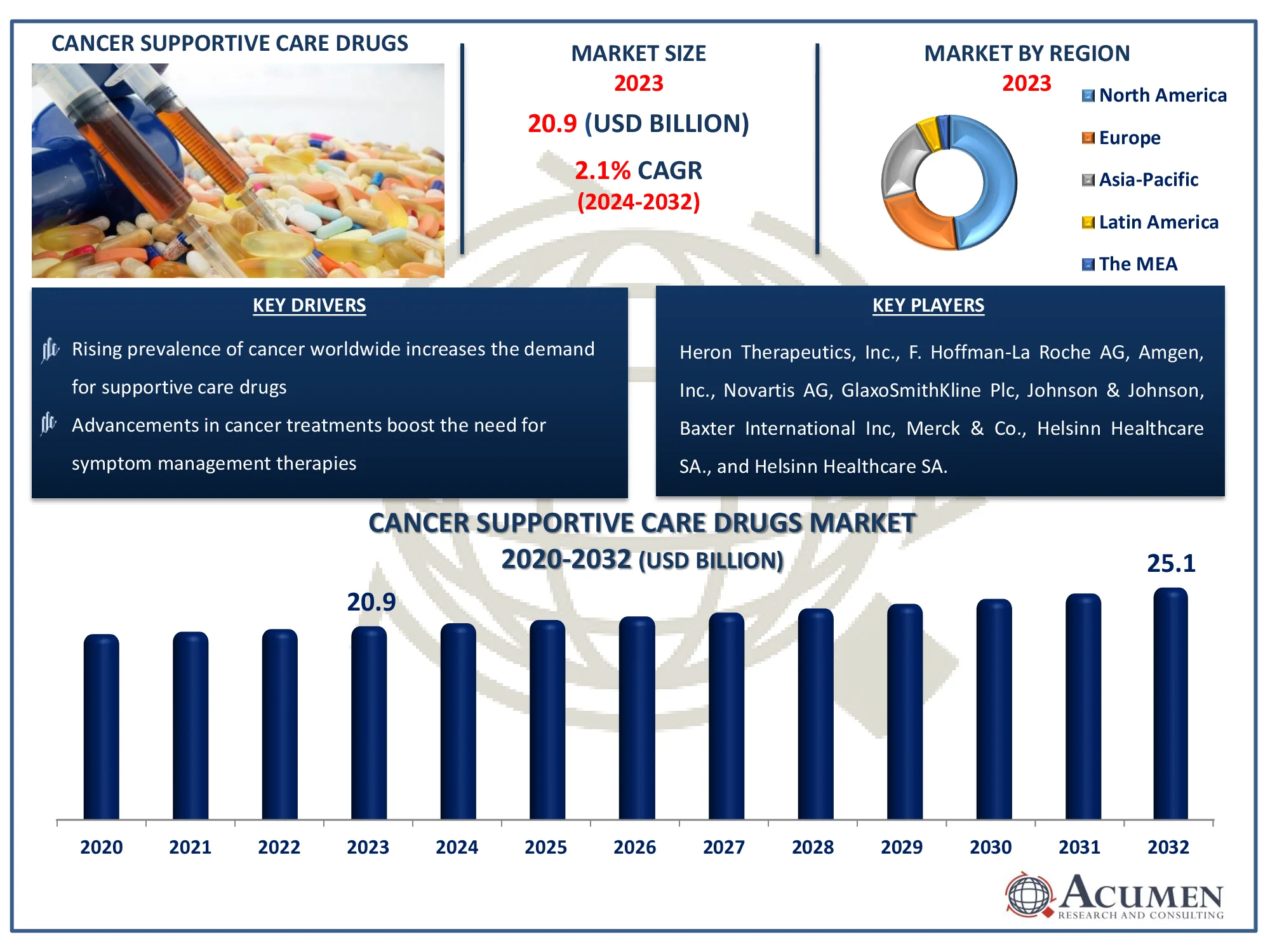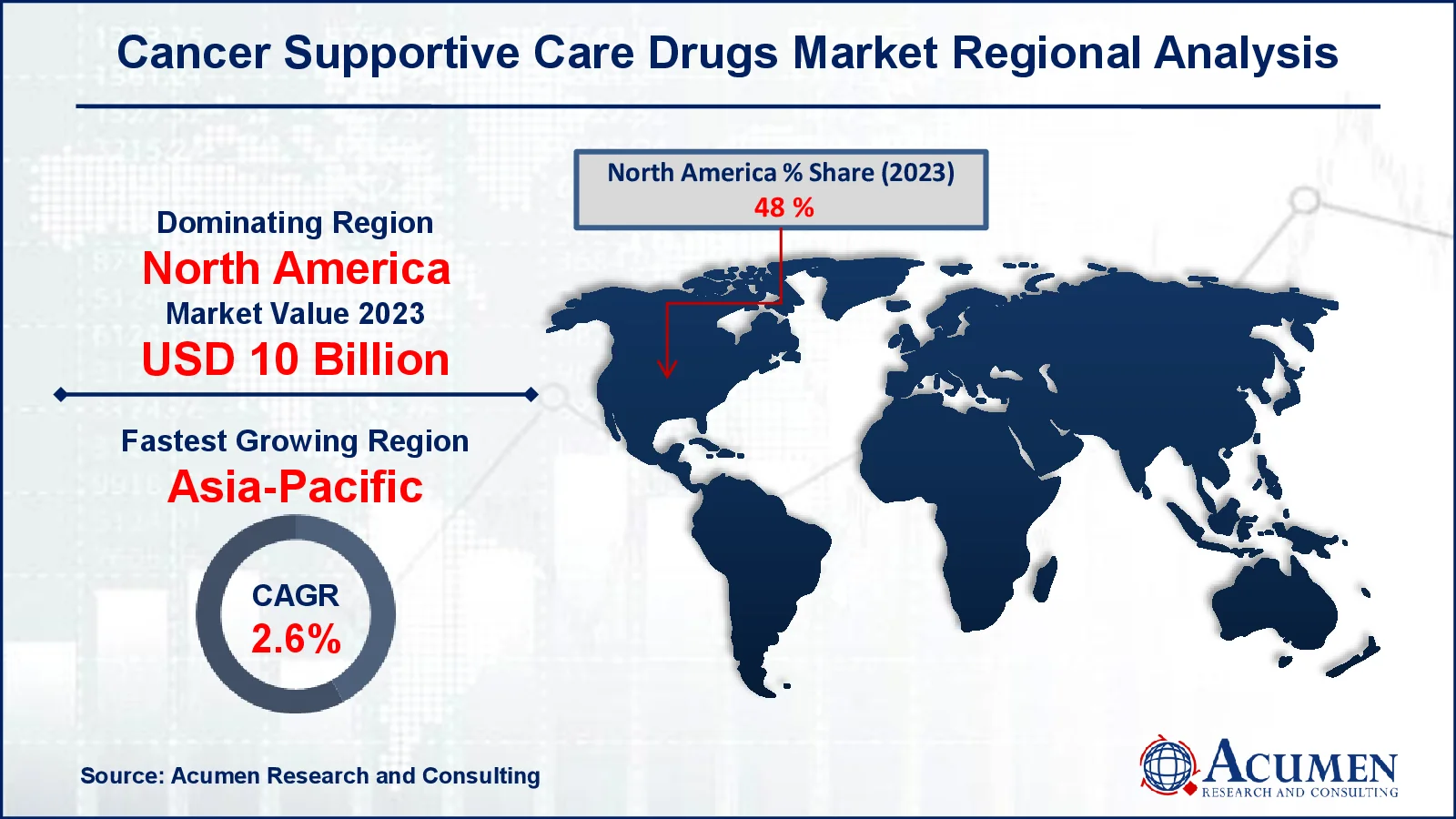Cancer Supportive Care Drugs Market | Acumen Research and Consulting
Cancer Supportive Care Drugs Market Size - Global Industry, Share, Analysis, Trends and Forecast 2024 - 2032
Published :
Report ID:
Pages :
Format : ![]()
The Global Cancer Supportive Care Drugs Market Size accounted for USD 20.9 Billion in 2023 and is estimated to achieve a market size of USD 25.1 Billion by 2032 growing at a CAGR of 2.1% from 2024 to 2032.
Cancer Supportive Care Drugs Market Highlights
- Global cancer supportive care drugs market revenue is poised to garner USD 25.1 billion by 2032 with a CAGR of 2.1% from 2024 to 2032
- North America cancer supportive care drugs market value occupied around USD 10 billion in 2023
- Asia-Pacific cancer supportive care drugs market growth will record a CAGR of more than 2.6% from 2024 to 2032
- Among application, the lung cancer sub-segment generated notable revenue in 2023
- Based on type, the granulocyte-colony stimulating factors sub-segment generated around 28% cancer supportive care drugs market share in 2023
- Rising availability of biosimilars opens new avenues for cost-effective supportive care solutions is a popular cancer supportive care drugs market trend that fuels the industry demand

The abnormal and uncontrolled proliferation of cells induced by mutations leading to migration of tumor formation to separate areas of the human body is characteristic of the cancer. Metastasis is called this migration of tumor cells. Therapeutic treatments for cancer support include medicines for cancer prevention and treatment. These decrease side effects induced by cancer treatments and thus help to increase people's life expectancy. These treatments are used for supporting cancer pain because of cancer, neutropenia, chemotherapy-related nausea and bone metastasis.
Global Cancer Supportive Care Drugs Market Dynamics
Market Drivers
- Rising prevalence of cancer worldwide increases the demand for supportive care drugs
- Advancements in cancer treatments boost the need for symptom management therapies
- Growing awareness of cancer-related complications drives the adoption of supportive care drugs
- Increasing healthcare spending and supportive government policies enhance market growth
Market Restraints
- High costs of cancer supportive care drugs limit patient accessibility
- Side effects associated with certain supportive care drugs hinder market acceptance
- Limited reimbursement in emerging economies poses challenges for market growth
Market Opportunities
- Expansion of oncology treatment centers in developing regions offers growth potential
- Technological innovations in drug delivery methods improve treatment outcomes
- Increasing focus on personalized medicine creates demand for targeted supportive care drugs
Cancer Supportive Care Drugs Market Report Coverage
| Market | Cancer Supportive Care Drugs Market |
| Cancer Supportive Care Drugs Market Size 2022 |
USD 20.9 Billion |
| Cancer Supportive Care Drugs Market Forecast 2032 | USD 25.1 Billion |
| Cancer Supportive Care Drugs Market CAGR During 2023 - 2032 | 2.1% |
| Cancer Supportive Care Drugs Market Analysis Period | 2020 - 2032 |
| Cancer Supportive Care Drugs Market Base Year |
2022 |
| Cancer Supportive Care Drugs Market Forecast Data | 2023 - 2032 |
| Segments Covered | By Type, By Application, By Distribution Channel, And By Geography |
| Regional Scope | North America, Europe, Asia Pacific, Latin America, and Middle East & Africa |
| Key Companies Profiled | Heron Therapeutics, Inc., F. Hoffman-La Roche AG, Amgen, Inc., Novartis AG, GlaxoSmithKline Plc, Johnson & Johnson, Baxter International Inc, Merck & Co., and Helsinn Healthcare SA. |
| Report Coverage |
Market Trends, Drivers, Restraints, Competitive Analysis, Player Profiling, Covid-19 Analysis, Regulation Analysis |
Cancer Supportive Care Drugs Market Insights
Crucially, the cancer supportive care drugs market is driving the growing incidence of cancer illness, the quickly growing biopharmaceutical sector, the growing scholarly & clinical study activities, increased cooperation among awareness-raising organisations, lifestyle changes, advances in healthcare, new therapeutics and increased per capita revenue. Increasing development has led to significant progress in cancer research and therapy in the biopharmaceutical sector. Drug discovery developments have led in lower death rates among patients suffering from cancer. Improvements were made in cancer pain management, however because of bad evaluation by doctors and the absence of appropriate understanding of new medicines and therapy these improvements have been underutilized. The main constraints of the cancer-supporting therapy industry are the lack of knowledge of distinct therapeutics in emerging economies used for cancer support, elevated therapy costs, strict government regulation and unfavourable rates of reimbursement.
Market Insights
A wide range of side-effects, including particular, customized medicines, is expected to boost development in use of biosimilars, increased health care spending, and efficient therapy methodologies available. It is estimated that 12,7 million individuals are diagnosed with cancer and 7,6 million fatalities are reported each year, according to the International Agency for Research on Cancer (IARC). Lung cancer and breast cancer are the most prominent kinds of cancer in which supporting medications are the most demanded.
China and India are one of the promising targets for cancer market development in support of care. In these two nations the market is sharply affected by the factors such as the increasing adoption of biosimilar, useful health reforms and low cost bases.
In the cancer support sector, several unmet demands continue. Current approaches to therapy only provide symptomatic relief. An important region for unsatisfactory needs in cancer supporting the market remains effective analgesic medicines with a reduced danger of tolerance and abuse.
A set of clinical guides has been suggested by the European Society of Medical Oncology that are a collection of suggestions for cancer treatment. This Guideline covers the administration of anticancer, febrile neutropenia, chemotherapy avoidance and nausea and vomiting induced radiation therapy, early cancer treatment, oral and gastrointestinal mucosal lesion, sophisticated palliative care planning, bone health, and other cancer care.
The trend in cancer treatment is emerging owing to the fast increase in drug discovery and development process for medicine that can reduce the after-effects of the complication during and after therapy for individuals, helping to increase cancer patients ' life expectancy. The market in the prediction era is anticipated to increase awareness and cooperation among major organisations to support cancer support programs.
Cancer Supportive Care Drugs Market Segmentation
The worldwide market for cancer supportive care drugs is split based on type, application, distribution channel, and geography.
Cancer Supportive Care Drugs Market By Type
- NSAIDs
- Granulocyte-Colony Stimulating Factors
- Bisphosphonates
- Erythropoiesis Stimulating Agents
- Anti-emetics
- Opioids
According to cancer supportive care drugs industry analysis, the biggest proportion of stimulating factors for granulocytes (G-CSFs), such as Amgen's Neupogen and Neulasta, was compared with opia. This report highlights brands prescribed in cancer support services, like Amgen's Neupogen, Neulasta, Epogen and Xgeva, Merck's Emend, NeoRecormon from Roche, Aloxi from Helsinn, Sustol from Heron and Cinvanti. Due to significant losses in patents and less use of myelosuppressive chemotherapy the share in the G-CSF drug class will decrease throughout the cancer supportive care drugs market forecast period.
Most biosimilar goods were present in the G-CSF and ESAs class, which have allowed access to accessible patient care to be improved. Due to the new product launches, the anti-emetics drug class is expected to grow safely in the same period. The space is currently dominated by targeted treatments, which are expected to increase over the forecast time. The development of cancer-supporting medicines in the coming years is being contained in factors such as increased use of immuno-oncological agents.
Cancer Supportive Care Drugs Market By Application
- Lung Cancer
- Breast Cancer
- Colorectal Cancer
- Liver Cancer
- Prostate Cancer
- Stomach Cancer
- Others
Among the numerous applications for cancer supportive care drugs market forecast, lung cancer is expected to dominate the industry throughout 2024 to 2032. This is primarily owing to the high global incidence and mortality rates of lung cancer, which are influenced by risk factors such as smoking, environmental contaminants, and genetic predisposition. As the incidence of lung cancer patients rises, so does the demand for supportive care therapies, such as treatments for chemotherapy-induced side effects such as nausea, anemia, and infections. Furthermore, advances in lung cancer treatment procedures and supportive care medications continue to enhance patient outcomes, driving rising demand in this category.
Cancer Supportive Care Drugs Market By Distribution Channels
- Hospital Pharmacies
- Drug Stores and Retail Pharmacies
- Online Providers
Hospital pharmacies are intended to be the primary distribution channel for cancer supportive care drugs market. This supremacy is largely due to patients' immediate access to drugs while receiving treatment at healthcare institutions. Cancer patients frequently require quick and specialized supportive care drugs to handle treatment side effects such as nausea, exhaustion, and infections, therefore hospital pharmacies are the most accessible and dependable alternative. Furthermore, hospital pharmacies often stock a greater range of oncology-related pharmaceuticals, ensuring that patients have access to crucial therapies as part of their overall cancer therapy, reinforcing their position as the principal distribution channel.
Cancer Supportive Care Drugs Market Regional Outlook
North America
- U.S.
- Canada
Europe
- U.K.
- Germany
- France
- Spain
- Rest of Europe
Asia-Pacific
- India
- Japan
- China
- Australia
- South Korea
- Rest of Asia-Pacific
Latin America
- Brazil
- Mexico
- Rest of Latin America
The Middle East & Africa
- South Africa
- GCC Countries
- Rest of the Middle East & Africa (ME&A)

Cancer Supportive Care Drugs Market Regional Analysis
In terms of cancer supportive care drugs market analysis, with a share of more than 48% in 2023, North America resulted the market. While there is a low biosimilarity number in the United States, biosimilar penetration is expected to rise because of the average biologic price twice.
Over the previous few years, Japan has experienced considerable biosimilar uptake. One of the main variables expected in stimulating cancer support drug market growth is the increasing incidence of cancer together with numerous side effects connected with cancer treatment. The cancer promotion industry also benefits the increased use of biosimilars, healthcare expenditure and accessibility of efficient techniques of therapy, including target-specific and custom medicines.
Cancer Supportive Care Drugs Market Players
Some of the top cancer supportive care drugs market companies offered in our report includes Heron Therapeutics, Inc., F. Hoffman-La Roche AG, Amgen, Inc., Novartis AG, GlaxoSmithKline Plc, Johnson & Johnson, Baxter International Inc, Merck & Co., and Helsinn Healthcare SA.
Frequently Asked Questions
How big is the cancer supportive care drugs market?
The cancer supportive care drugs market size was valued at USD 20.9 billion in 2023.
What is the CAGR of the global cancer supportive care drugs market from 2024 to 2032?
The CAGR of cancer supportive care drugs is 2.1% during the analysis period of 2024 to 2032.
Which are the key players in the cancer supportive care drugs market?
The key players operating in the global market are including Heron Therapeutics, Inc., F. Hoffman-La Roche AG, Amgen, Inc., Novartis AG, GlaxoSmithKline Plc, Johnson & Johnson, Baxter International Inc, Merck & Co., and Helsinn Healthcare SA.
Which region dominated the global cancer supportive care drugs market share?
North America held the dominating position in cancer supportive care drugs industry during the analysis period of 2024 to 2032.
Which region registered fastest CAGR from 2024 to 2032?
Asia-Pacific region exhibited fastest growing CAGR for market of cancer supportive care drugs during the analysis period of 2024 to 2032.
What are the current trends and dynamics in the global cancer supportive care drugs industry?
The current trends and dynamics in the cancer supportive care drugs industry include rising prevalence of cancer worldwide increases the demand for supportive care drugs, advancements in cancer treatments boost the need for symptom management therapies, growing awareness of cancer-related complications drives the adoption of supportive care drugs, and increasing healthcare spending and supportive government policies enhance market growth.
Which distribution channel held the notable share in 2023?
The hospital pharmacies distribution channel held the notable share of the cancer supportive care drugs industry. 



